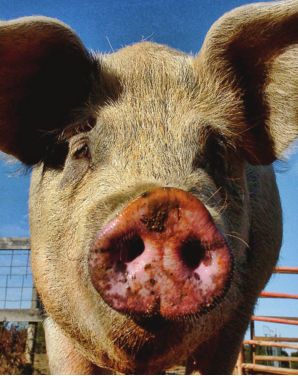Livestock industry opposes feedlot registration
Proposed regulation part of major shift for Illinois EPA
ENVIRONMENT | Patrick Yeagle
Livestock producers in Illinois oppose a regulation that would require feedlots to register with the state, but a legislative panel appears poised to approve the regulation.
The proposal is part of a series of changes to how Illinois regulates confined animal feeding operations, known as CAFOs, after the U.S. Environmental Protection Agency ordered changes in 2010.
CAFOs usually consist of several hundred cattle, swine, poultry or other animals enclosed in a building or pen. One of the issues raised by this method is what to do with the manure generated. It is often spread on fields as fertilizer, but the stored manure sometimes leaks or is dumped into nearby bodies of water, where it can poison wildlife.
The Illinois Environmental Protection Agency has been working with U.S. EPA since 2010 on a work plan to beef up the state’s oversight of CAFOs. Among the changes U.S. EPA ordered was developing an inventory of CAFOs to make it easier for IEPA to track problems. Sanjay Sofat, director of IEPA’s Division of Water Pollution Control, says his staff has developed the inventory and submitted it to U.S. EPA for approval.
To make updating the CAFO inventory easier in the future, environmental groups asked the Illinois Pollution Control Board, which mediates environmental issues involving regulations, to require CAFO operators to register with the state.
An agricultural coalition composed of the Illinois Pork Producers Association, Illinois Farm Bureau, Illinois Beef Association and Illinois Milk Producers Association, opposed the measure, saying it oversteps the boundaries of the state’s authority. The coalition also said IEPA doesn’t need the information, and that it was unduly burdensome on farmers.
The coalition’s argument is predicated on the fact that the state draws its authority to regulate CAFOs from federal law, and there is no federal requirement for CAFO registration. The U.S. EPA proposed such a rule in 2011, but withdrew it in 2013 under pressure from a lawsuit by the livestock industry. The federal agency concluded the rule was unnecessary because the states could collect the information on their own.
Danielle Diamond, an attorney for Illinois Citizens for Clean Air and Water, says she was surprised that IEPA originally opposed requiring CAFOs to register.
“We thought it would make their job easier, so they don’t have to go out and track down all that information,” Diamond said.
IEPA dropped its opposition to the registration requirement after the Illinois Pollution Control Board incorporated it into its recommended rule changes. Before the new rules can take effect, they must be approved by the Joint Committee on Administrative Rules, a legislative body that oversees regulations. JCAR is scheduled to consider the proposal on May 20 in Springfield.
The proposed rule changes stem from a letter written to U.S. EPA in March 2008 by a pair of environmental groups. Illinois Citizens for Clean Air and Water and the Washington, D.C.-based Environmental Integrity Project asked U.S. EPA to revoke the state’s authority to enforce the National Pollutant Discharge Elimination System, a set of nationwide regulations limiting the dumping of foreign substances like manure into waterways. The environmental groups accused IEPA of failing to adequately regulate CAFOs, factory farms or feedlots.
The U.S. EPA did an informal investigation and found several deficiencies in IEPA’s regulatory practices concerning CAFOs. In September 2010, the federal and state agencies agreed on a work plan to fix the deficiencies, which IEPA has been working through ever since.
Sanjay Sofat at IEPA says his agency has made significant progress on the work plan. IEPA now has adequate staff to investigate potential problems at CAFOs, regularly conducts site visits and has established standard operating procedures for handling citizen complaints about CAFOs.
Taken together, the new rules and the increased enforcement represent a shift in how IEPA approaches CAFOs. Previously, IEPA only sought to enforce the prohibition against dumping when someone filed a complaint. Now, the agency periodically examines CAFOs around the state, handling issues as they are discovered by inspectors.
“The focus has definitely changed from the past,” Sofat said. “It is definitely more proactive, and our program is much more established and mature now.”
Contact Patrick Yeagle at [email protected].